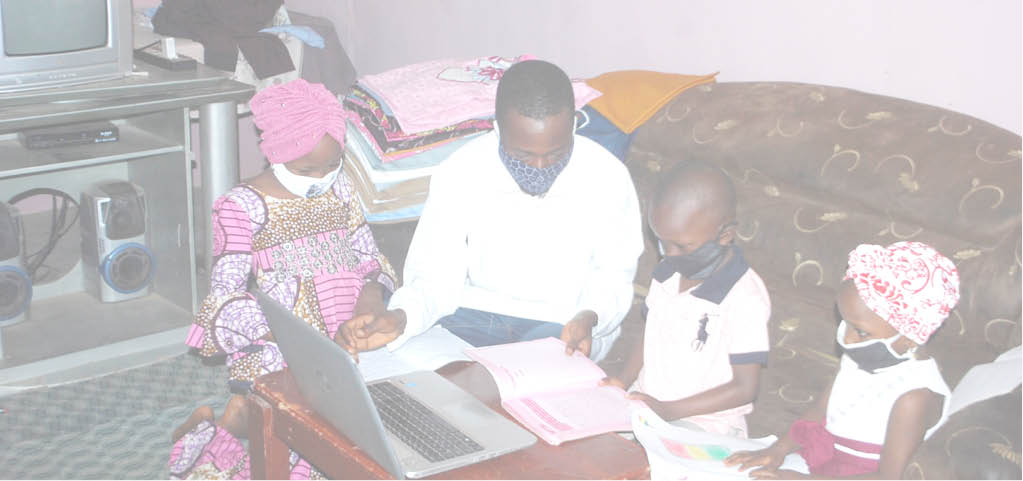Parents have now resorted to home-schooling, an option in which they help in teaching their children, as schools take to virtual learning which requires parental involvement in the tasks assigned to students.
Parents who spoke to our reporters on the new arrangement expressed divergent views on their experiences in teaching their wards at home.
A parent in Abuja who pleaded for anonymity said virtual learning is actually the best way of delivering lesson to kids in the lockdown. He said he assists his children to learn at home and communicate with their teachers using online apps.
In Minna, Niger State, Mrs Aisha Usman said teaching her children was tough and challenging.
She said “teaching my children is one thing I never expected will happen because I never saw that coming and I did not prepare for it.”
Usman explained that before the closure, her kids attended extra lessons after school hours at home but under the care of a private teacher who helped them with their homework.
For Mrs Fatimah Isah, there is tension in teaching kids. She said she taught her children alongside a private teacher who lived in her area.
Mr John Emmanuel, on his part, said home teaching was cumbersome, time-consuming and expensive.
“I spend more money on data because the gadgets we use have to be connected to the internet for three to four hours daily to participate in the online classes. Then you wait to record, take photograph and upload the materials provided. In fact, it is not easy and I cannot wait for schools to resume,” he said.
Halimat Abudu, in Benin, Edo State, said combining home and office work along with assisting children with their assignments was not easy because she spent a lot of time with the children.
“I have four children who are learning online and I have to attend to all of them individually because they are in different classes. The multi-tasking at times drives one crazy because as you are doing home chores, they will be calling you to come and teach them one thing or the other.
“Because of the pressure, I have fixed Sundays to attend to the children’s assignment.
She said virtual classes also drained the finance of the family as money was spent on data in addition to buying expensive gadgets.
Another parent, Osarodion Moses said, “We do not have time to rest since schools started online teaching; as you return from work, instead of resting, you start helping the children with their assignment.
“It has not really been easy but it has made children not to be idle at home,” he said.
Parents who spoke to our correspondent in Ilorin, Kwara State explained the difficulties they was experiencing to get their children educated through the online learning programme and radio lesson.
Alade Odunjo, a civil servant said, “The e-learning programme is new to us. Unfortunately, because of our peculiar situation – epileptic power supply, poor network and getting data to keep the children learning programme going – it has been difficult for most parents to handle.
“I have spent so much on data even though the network has been bad in my place at Sawmill area of Ilorin, I just can’t leave my three children to be idle for the long period that schools have been shut.”
Another parent, Isiaka Olatunji, said the online teaching method was not easy as parents were made to believe.
“There is no stable electricity and children cannot watch and learn from the television programmes of the state government. Television and radio lessons are not as effective as in the classroom. I have to call my children every day from work to instruct them on how to download and how to send their work to their teachers.”
Many parents spoken with in Ebonyi State said they did not have the time to teach their children in the lockdown.
Another challenge in radio lessons is that parents in rural areas were predominantly not literate, thus, they could not attend to the academic needs of their children; while working parents had no time to teach, another parent said.
Mrs Easter Aloh said, “I do not really have enough time to teach my kids, except on weekends because of the nature of my job. I usually leave home by 7:30am and return around 4:30pm, sometimes even past that period.
“So I engaged a teacher who teaches my children at home and they are doing well, especially my daughter who is in nursery 3.
“She is the type that is afraid of punishment and that might have contributed to her poor performance at school,” she said.
Meanwhile, Ebonyi State government has initiated a plan to bridge the learning gap by extending computers and internet access to students in rural areas.
The plan, the Commissioner for Education, Dr Onyebuchi Chima, said was to boost its ongoing e-learning programmes.




